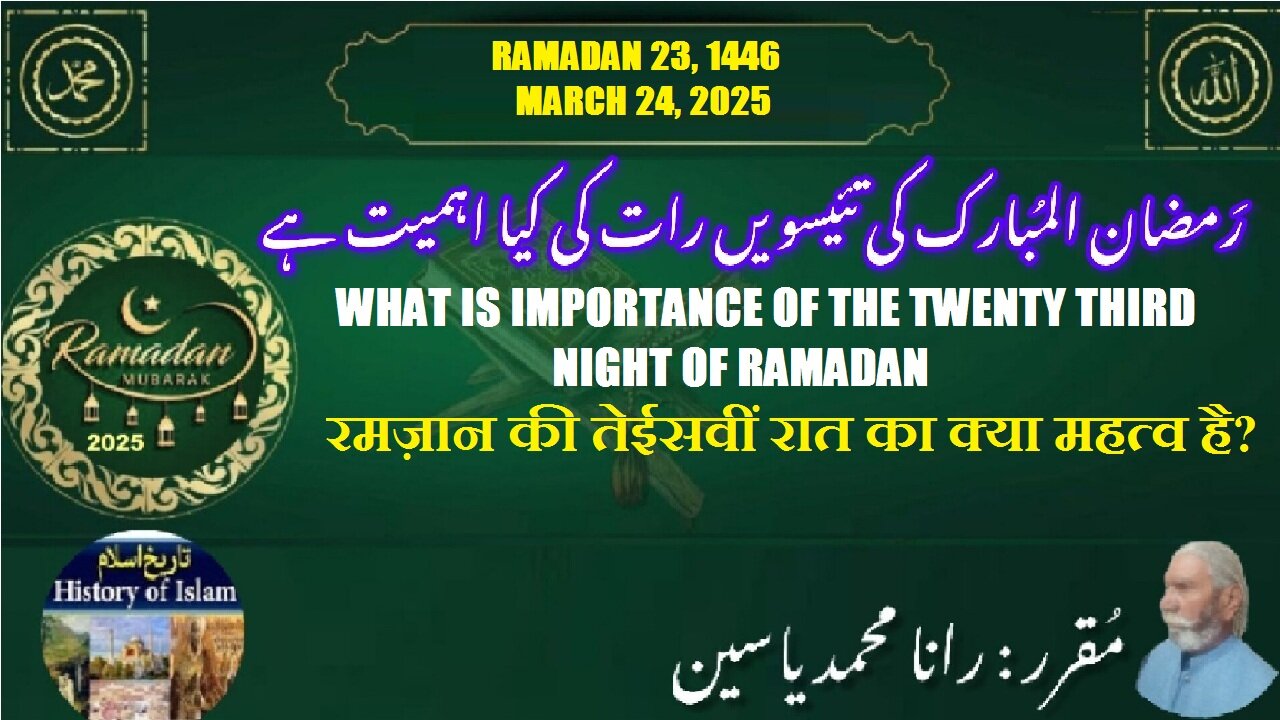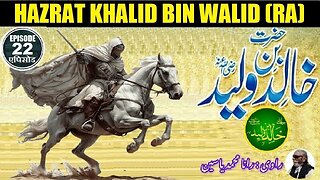Premium Only Content

What is Importance of the twenty third night of Ramadan رمضان المبارک کی تئیسویں رات کی کیا اہمیت ہے
@islamichistory813 #ramadan2025 #ramadannights #spiritual #reflection #importance #twentythirdnight #islamic #teachings #nightofpower #faith #journey #blessednights #ramadan #reflections #islamicfaith
What is Importance of the twenty third night of Ramadan?
Sisters, brothers, friends and elders asslamoalaikum, in this islamic informative video, toda we are going to describe the significance of the twenty-third night of Ramadan, a night that holds immense spiritual value for millions of Muslims around the world. Often believed to be one of the odd nights of the last ten days of Ramadan, this night is associated with profound blessings and opportunities for prayer and reflection. So please be with us upto end of this video as we are describing the historical context, religious teachings, and personal experiences that highlight why this night is considered a pivotal moment in the holy month. Get to know that how you can make the most of this sacred time through acts of worship and devotion.
The twenty-third night of Ramadan is considered one of the most significant nights in the Islamic calendar, as it falls within the last ten nights of the holy month. These last ten nights are the most spiritually powerful, as they contain Laylat al-Qadr (the Night of Decree or Power), which is described in the Qur’an as being "better than a thousand months" (Surah Al-Qadr, 97:3). While the exact date of Laylat al-Qadr remains unknown, Islamic traditions suggest that it is most likely to occur on one of the odd-numbered nights of the last ten days of Ramadan, including the twenty-third night. This uncertainty encourages Muslims to engage in increased worship, prayer, and devotion throughout these nights, ensuring that they do not miss the immense blessings and rewards associated with Laylat al-Qadr.
One of the key aspects of the twenty-third night of Ramadan is the heightened level of spiritual devotion and worship. Since the Prophet Muhammad (peace be upon him) encouraged his followers to seek Laylat al-Qadr in the last ten nights, particularly in the odd-numbered nights, the twenty-third night becomes an essential occasion for Muslims to intensify their acts of worship. Many believers spend this night in prolonged prayers, reciting the Qur’an, making supplications (duas), and engaging in dhikr (remembrance of Allah). The rewards of worship on this night are believed to be multiplied beyond imagination, as any good deed performed during Laylat al-Qadr carries the reward of a thousand months of worship. Since it is unknown whether the twenty-third night specifically is Laylat al-Qadr, Muslims remain vigilant in their devotion, striving to maximize their rewards.
The night is also significant as a time for seeking forgiveness and spiritual purification. The Prophet Muhammad (peace be upon him) taught that whoever stands in prayer during Laylat al-Qadr with sincere faith and expectation of reward will have all their past sins forgiven. This makes the twenty-third night a crucial opportunity for believers to repent and seek Allah’s mercy. Muslims use this time to reflect on their past actions, seek forgiveness for their mistakes, and make resolutions to lead a more righteous life. Many people engage in heartfelt supplications, asking for guidance, blessings, and protection from harm. The idea that sins can be completely wiped away on this night provides a sense of hope and renewal, motivating individuals to improve themselves spiritually and morally.
Additionally, the twenty-third night of Ramadan is marked by the practice of I’tikaf, a spiritual retreat in the mosque. Many devout Muslims dedicate themselves to I’tikaf during the last ten days of Ramadan, staying in the mosque to focus solely on worship and cut off from worldly distractions. This period of seclusion allows individuals to deepen their connection with Allah, reflect on their faith, and immerse themselves in prayer and contemplation. Even those who do not participate in full I’tikaf often spend the odd-numbered nights, including the twenty-third night, in the mosque for extended prayers such as Taraweeh and Tahajjud. The communal atmosphere of worship enhances the spiritual experience, as believers come together in unity, seeking Allah’s blessings.
The twenty-third night of Ramadan is also significant in terms of divine decree. Islamic teachings suggest that during Laylat al-Qadr, Allah’s commands for the coming year regarding life, death, sustenance, and other matters are decreed and written by the angels. Since there is a possibility that the twenty-third night could be Laylat al-Qadr, it is a time for Muslims to sincerely pray for a good future, seeking Allah’s guidance, protection, and blessings for themselves and their loved ones. Many people use this night to ask for relief from hardships, success in their endeavors, and good health. The belief that one's destiny for the coming year may be determined on this night motivates Muslims to engage in acts of kindness, charity, and sincere supplication.
Another important aspect of the twenty-third night of Ramadan is the sense of peace and tranquility that accompanies it. Many believers report experiencing a special serenity and closeness to Allah during their prayers on this night. The Qur’an describes Laylat al-Qadr as a night of peace until the break of dawn (Surah Al-Qadr, 97:5). This description suggests that those who dedicate themselves to worship on this night may experience an inner calm and spiritual enlightenment that strengthens their faith. The presence of angels descending to the earth, as mentioned in Islamic traditions, is believed to create an atmosphere of divine blessings and mercy, making it easier for worshippers to concentrate and connect with Allah.
Furthermore, the twenty-third night of Ramadan is a time for increased generosity and charitable acts. Muslims believe that giving charity during Laylat al-Qadr holds immense rewards, as good deeds are multiplied many times over. Therefore, many people use this night as an opportunity to help those in need, whether by donating money, providing food for the less fortunate, or supporting community projects. The spirit of giving reinforces the values of compassion, empathy, and social responsibility, which are fundamental principles in Islam. Many believers also use this time to seek Allah’s blessings for their wealth and sustenance, understanding that acts of charity can lead to increased prosperity and divine favor.
In addition to its religious and spiritual significance, the twenty-third night of Ramadan also has a personal impact on the lives of believers. It serves as a moment of reflection, self-improvement, and personal growth. Many people use this night to make sincere resolutions to become better individuals, whether in their personal relationships, work ethics, or religious practices. The heightened awareness of Allah’s presence and the emphasis on accountability encourage believers to strive for moral excellence and avoid sinful behaviors. The motivation gained from this night often carries forward beyond Ramadan, inspiring individuals to maintain their faith and devotion throughout the year.
In conclusion, the twenty-third night of Ramadan holds immense significance as one of the odd nights in the last ten days, possibly being Laylat al-Qadr. It is a night of unparalleled spiritual rewards, divine mercy, and forgiveness. Muslims around the world dedicate themselves to worship, prayer, and charity, seeking Allah’s blessings and guidance. The night serves as an opportunity for personal transformation, reflection, and renewal, reminding believers of the importance of sincerity, devotion, and kindness. Whether or not it is the exact night of Laylat al-Qadr, the twenty-third night of Ramadan remains a powerful moment for Muslims to strengthen their faith, seek Allah’s forgiveness, and strive for a righteous and fulfilling life.
With this, we seek permission until tomorrow, and pray to Allah Almighty to grant us the ability to follow the Quran and Sunnah, and to grant those who have passed away from us a place in Paradise. Amen.
========================
-
 12:20
12:20
ISLAMIC HISTORY
22 hours agoKhalid bin Walid (RA) Islamic Warrior Episode 22 خالد بن ولید رضی اللہ عنہ اسلامی جنگجو قسط نمبر
2 -
 8:21
8:21
MattMorseTV
14 hours ago $6.31 earnedTrump just SCORED a $500,000,000 LEGAL WIN.
82.4K34 -
 2:11:05
2:11:05
Side Scrollers Podcast
18 hours agoDISASTROUS Cracker Barrel Rebrand + Destiny PDF Allegations + More | Side Scrollers Live
60.8K23 -
 18:57
18:57
Nikko Ortiz
16 hours agoTexas Stand Your Ground Law
8.79K3 -
 18:55
18:55
GritsGG
10 hours agoFastest Killing Warzone SMG!
4.15K -
 LIVE
LIVE
Lofi Girl
2 years agoSynthwave Radio 🌌 - beats to chill/game to
211 watching -
 12:48
12:48
The Pascal Show
7 hours ago $0.10 earnedEX FILES RESTRAINING ORDER! Jake Haro's EX Files Amid Search For Missing Emmanuel Haro
4.54K -
 16:22
16:22
Michael Button
7 days ago $1.66 earnedThe Timeline of Civilization is Completely Wrong
15.8K3 -
 10:02
10:02
Liberty Hangout
14 days agoPaid Protestors Silence Reasonable Democrat
43.3K54 -
 2:17:55
2:17:55
FreshandFit
5 hours agoMr Organik Vs Garry The Numbers Guy “N Word” Debate!
102K13